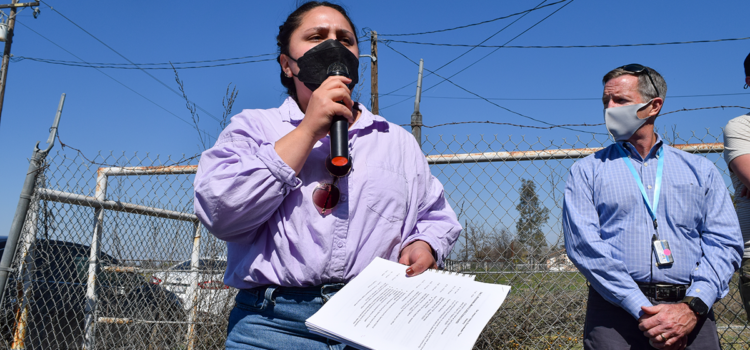
Editor’s Note: To celebrate Women’s History Month, Kern Sol News is highlighting notable woman leaders in Kern County who are working to create positive change in their community.
Amid the pandemic, Emma De La Rosa was searching for a job where she could do more intentional work directly with Kern County residents when she began her employment with Leadership Counsel.
De La Rosa’s work as a regional policy manager allows her to work closely with the community on various environmental, housing, and economic development issues they may face.
“Currently I’ve been most active with the communities in Fuller Acres working alongside them to advocate for clean water. They currently have TCP in their water and the company has been in violation for about 3 years,” said De La Rosa. “A lot of residents are Latinx and speak Spanish and were never really able to participate in any of the meetings.”
Additionally, De La Rosa has been active in Kern’s housing community as she advocates on behalf of residents to ensure that they benefit from funding given to the County for housing. Working with the Rent and Utility Assistant Program (RUP), De La Rosa can speak with residents about their housing situations and needs.
She states that learning about all the substandard housing conditions — lighting issues, water issues, increased rent, and evictions — resonated with her due to her upbringing. She shared that, growing up, her mother was on food stamps and would have to occasionally be on welfare.
“I remember her having to struggle to complete those quarterly reports where she didn’t even know what they said. Even if it was in Spanish, the accessibility wasn’t there. Me being 12 years old, she would ask me how to fill them out or to help her translate,” De La Rosa shared. “I remember my mom going to the Human Social Services building and not being treated fairly and being treated like crap at times.”
De La Rosa continued by saying that she’ll always remember when her mother’s benefits got cut off because her savings account had risen above $2,000.
“$2,000 as savings for a family of four really isn’t a lot but even then our food stamps would be taken away because they thought she made too much,” she said. “My mom is a single mom and she cleaned houses — she currently still does clean houses — and so, to me, it was like why is this program here? It’s supposed to help people like us and our communities but anytime people try to progress or save money, this program goes and pulls out their support. It just didn’t make sense to me.”
To Emma De La Rosa, these programs seemed to perpetuate poverty rather than empower residents to be able to be better financially. This inspired De La Rosa to begin her engagement in policy, though she didn’t begin to fully understand the world of policy until she got to grad school.
De La Rosa was the first in her family to attend college. She’s the oldest of three daughters, and daughter to a Mexican immigrant from Zacatecas, Mexico. Her grandfather was a Bracero in the 1940s, which led to her family immigrating to the United States. De La Rosa said her upbringing instilled the values of respect, humility, justice, and hard work in her and she takes these with her in every step of her life.
“My whole point was to be able to engage in policy to ensure that whatever solutions were being created were actually going to help communities and not make it worse,” she said.
De La Rosa shared that her experience with food stamps revealed just how discriminatory and rooted in white supremacy the system could be. She explained that there are always stigmas and a perception of “laziness” that are associated with poverty.
“That was our story,” De La Rosa revealed. “As the oldest, I wanted to help my mom. As soon as I could get a job, I began working at McDonald’s in high school. But even before then, she would always take me and my sisters to work. So we grew up going with her to clean houses every summer or Saturdays.”
De La Rosa continued to say that her struggles have helped her be understanding towards the stories she hears from Kern residents.
She said that empathy goes a long way towards aiding the challenges these residents face. She suggests that County officials go through culturally responsive training to understand the experiences these residents face because of systemic oppression. Additionally, she suggests policies that will help stabilize rent prices.
“I think another good policy would be inclusionary zoning,” De La Rosa suggests. “I remember growing up in low-income areas and everywhere that I looked my community looked disinvested. It’s disinvested even to this day. The park equipment wasn’t updated, there wasn’t enough green and there weren’t enough trees.”
De La Rosa believes that making sure low-income housing is distributed throughout the city and county in areas that don’t have high opportunities. In continuation, she believes this zoning needs to be complemented by investments in low-income communities.
“We all have the right to have thriving neighborhoods,” De La Rosa stated.
For any residents or community members that are interested in engaging in this work, De La Rosa urges them to share their stories.
If possible, De La Rosa encourages community members to attend Board of Supervisor and City Council meetings to share their stories directly with them.
“Residents are the backbone of the community and this work cannot happen without residents,” De La Rosa said. “There is so much power in storytelling and saying what you are going through and sharing your ideas on how the situation can be fixed.”
De La Rosa noted that those spaces aren’t always the most welcoming, and also encourages community members to engage with Leadership Counsel as the organization is constantly trying to build community power.
“All change that happens, happens because there is community power,” said De La Rosa.
